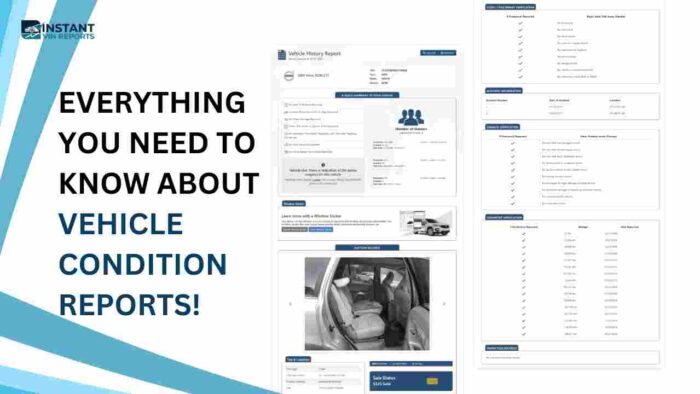When you’re buying a used car, there are so many options to choose from that it becomes a bit overwhelming sometimes. You want the absolute best but want to do so affordably and you choose to go for a used car. But how do you know if the vehicle you’re interested in is in good shape?
This is where a vehicle condition report comes into play. It provides detailed insights into a car’s current state, helping you avoid costly mistakes. With the right information, you can make confident decisions and drive away happy. Let’s get into the details.
What Is a Vehicle Condition Report?
A vehicle condition report is a comprehensive document that assesses a car’s physical and mechanical state. It serves as a snapshot of the vehicle, detailing everything from its exterior appearance to its internal mechanics. This report includes information about the vehicle’s history, including any accidents or major repairs it may have undergone.
The primary goal of this report is to give potential buyers an accurate overview of the car’s current condition. It’s like having a mechanic’s expertise at your fingertips, allowing you to understand what you’re getting into before you make a purchase. Knowing the specifics about a vehicle can save you time, money, and frustration in the long run.
What’s Included in a Vehicle Condition Report?
Typically, a vehicle condition report covers several key areas that provide valuable insights into the car’s overall health:
- Exterior Inspection: This section notes any dents, scratches, or rust on the body. Inspectors will look closely at paint quality and alignment of body panels to identify any signs of previous accidents.
- Interior Inspection: Here, you’ll find details about the upholstery, dashboard, and any visible wear and tear. Inspectors evaluate everything from seat functionality to electronic systems, ensuring that all features work as intended.
- Mechanical Evaluation: This part assesses critical components like the engine, brakes, tires, and suspension systems. A thorough mechanical evaluation helps identify any potential issues that could affect performance.
- Mileage Verification: Ensuring the odometer reading is accurate helps prevent mileage fraud. This verification process often involves cross-referencing service records with the reported mileage.
- Service History: A record of past repairs or maintenance can indicate how well the car has been cared for. Regular maintenance often signals that previous owners were diligent about keeping the vehicle in good shape.
READ ALSO: How To Decode a 13 Digit VIN Number (Step by Step Guide)
Why Are Vehicle Condition Reports Important?
Vehicle condition reports are crucial for several reasons that benefit both buyers and sellers:
- Transparency: They provide an unbiased assessment of the car’s state. This builds trust between buyers and sellers, making transactions smoother and more reliable.
- Informed Decisions: With this information in hand, buyers can decide whether a vehicle meets their needs. Knowing the strengths and weaknesses of a car allows for better comparisons with other options.
- Negotiation Power: If issues arise in the report, buyers can negotiate better prices or request repairs before finalizing the sale. This can lead to significant savings.
- Risk Mitigation: Identifying potential problems early can save buyers from costly repairs later. A proactive approach to understanding a vehicle’s condition can prevent future headaches.
- Safety Assurance: A thorough inspection helps ensure that critical safety components are functioning properly. Knowing that your brakes and tires are in good shape gives peace of mind while driving.
Understanding these factors as a buyer gives you the upper hand while searching for the perfect used car. You can make choices based on facts rather than assumptions. Let’s now see how a vehicle condition inspection works.
How Does a Vehicle Condition Inspection Work?
A vehicle condition inspection is usually performed by a certified mechanic or technician who specializes in assessing vehicle health. They evaluate the car’s condition before purchase or during routine maintenance to ensure everything is functioning correctly.
The process typically involves several steps:
- Visual Examination: The inspector conducts a thorough examination of both the exterior and interior of the vehicle. They look for signs of damage or wear that might not be immediately obvious.
- Mechanical Testing: The technician tests various mechanical components such as brakes, steering, suspension, and engine performance. They often take the car for a short drive to assess handling and responsiveness.
- Documentation: Any visible damage or defects are documented in detail within the report. This includes photographs where applicable, providing visual evidence of any issues found.
- Final Report Compilation: After completing all evaluations, the inspector compiles their findings into a detailed report outlining any issues found and recommendations for repairs or further inspections if necessary.
After receiving this report, you’ll have a clearer understanding of what you’re dealing with—allowing for informed decisions about your potential purchase.
Why Can’t I Perform My Own Vehicle Condition Inspection?
While it might seem tempting to inspect a vehicle yourself, there are several reasons why it’s not advisable:
- Lack of Expertise: Most people lack the technical knowledge needed to identify hidden issues effectively. What looks fine on the surface may hide deeper problems that only an experienced eye can catch.
- Tools and Equipment: Professional mechanics have specialized tools that help them conduct thorough inspections. For example, they may use diagnostic machines that read error codes from onboard computer systems—something most DIYers don’t have access to.
- Objective Assessment: A trained technician provides an unbiased view of the vehicle’s condition. Personal attachment or desire may cloud your judgment when inspecting your own potential purchase.
By relying on professionals for inspections, you gain peace of mind knowing that experts have thoroughly evaluated your prospective investment.
READ ALSO: How to Check a Trailer VIN Number
When Should I Have a Vehicle Condition Inspection Performed?
Timing is essential when it comes to vehicle inspections; knowing when to schedule one can save you from future headaches:
- Before Purchase: Always get an inspection before buying a used car. This helps you understand its true condition and avoid surprises down the line.
- After Major Repairs: If significant work has been done on the vehicle—like engine replacements or bodywork—an inspection can confirm everything was fixed correctly and is functioning as it should.
- Regular Maintenance: Periodic inspections help identify issues before they become costly problems. Think of it like going for regular check-ups at your doctor; prevention is always better than cure!
By staying proactive with inspections at these key moments, you can maintain your vehicle’s health over time and enjoy safer driving experiences.
Why Would I Want To Point Out the Negative Aspects of a Vehicle?
Highlighting negative aspects in a vehicle condition report may seem counterintuitive at first glance; however, it serves several important purposes:
- Builds Trust: Transparency about flaws shows integrity on the seller’s part. Buyers appreciate honesty and are more likely to engage with sellers who provide complete information about their vehicles.
- Facilitates Negotiations: Knowing what needs fixing allows for fair price negotiations between buyers and sellers. If significant issues exist, buyers can negotiate lower prices or request repairs before completing their purchase.
- Informs Buyers: Buyers appreciate knowing what they’re getting into upfront; understanding both strengths and weaknesses leads to better satisfaction after purchase.
This honest approach leads to better long-term relationships between buyers and sellers while also ensuring that everyone involved knows exactly what they’re dealing with.
Where Can I Get Vehicle Condition Reports?
Getting a vehicle condition report is easier than you think. Many automotive service shops and independent inspectors offer this service. However, if you’re looking for an online option that’s easy to access anytime, consider Instant VIN Reports. We provide detailed reports that include both vehicle history and current conditions—making it simple for you to get all necessary information in one place.
View a sample vehicle condition report!
For specific brands like Land Rover or other specialty vehicles, you can check out their dedicated Land Rover VIN check tool.
Conclusion
In conclusion, understanding vehicle condition reports is essential for anyone considering purchasing a used car. These reports provide valuable insights that help you make informed decisions while navigating potential pitfalls in the used car market confidently.
With tools like Instant VIN Reports at your disposal, you’ll be well-equipped to make choices that lead to satisfying ownership experiences for years ahead!










